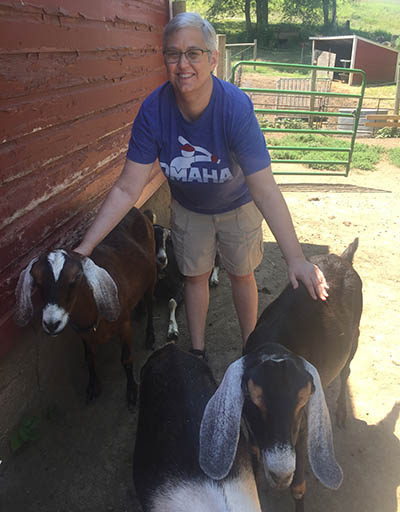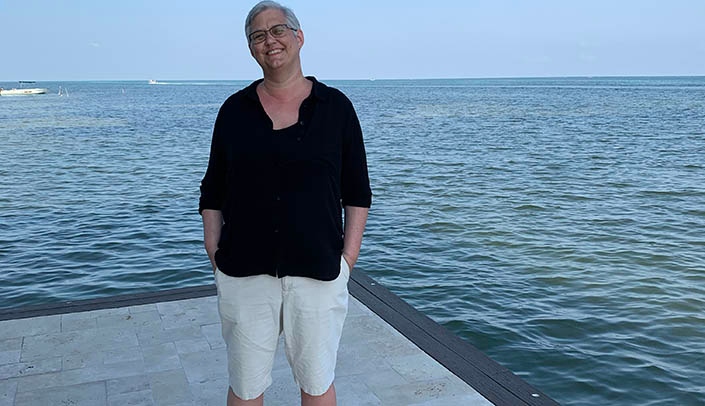I have struggled with depression since I was in my early teenage years. My first suicide attempt was when I was 13 years old, followed by several other attempts before I graduated from high school. Growing up in a small town, my parents didn’t seek help until they realized my problem wasn’t going away. Even then, I had to drive an hour away to see someone in a larger community. I felt shame for my struggles, so I kept the severity of my depression and suicidal tendencies to myself.
 |
Emily McElroy |
As an adult, I faced three moments when I was in crisis. All three times came out of nowhere without any events I could point to as the cause. The first was my senior year of college, when I stopped functioning. I would get to campus and catch the next subway ride back home, where I would sleep until the next time I had to attend class or take an exam. I would do the same thing of just switching subway platforms and riding back home. A friend finally intervened and took me to an outpatient crisis center. For nearly a month, she would take me to my appointments four days a week. I remained in outpatient crisis counseling for two months. Through the help of my therapist, I was slowly crawling out of a hole when my father was diagnosed with a terminal illness. It shook me out of my situation because I wanted to be there for my father, who meant the world to me. He said one of his dying wishes was to see me graduate. I had to make it happen. I continued therapy as I began a life of pharmaceutical interventions.
Around 10 years ago, I faced my second crisis. While I was in regular therapy, I kept the worst of my depression at bay. This time, I knew my suicidal ideation was getting worse. I called a close friend and asked if I could bring my dog and stay with him until the next day. With his help and a referral from my therapist, I went to an outpatient center. I lived with him for several months while I went to outpatient group therapy in the morning and my job in the afternoon. At some point, I just felt more stable, whether it was from a new medication or the intensive therapy I was receiving from multiple sources.
In 2019, I faced my last crisis. I am hopeful it is the last one. As someone who battles depression, I know my warning signs of when it is getting worse. This time, I wasn’t paying as close attention until it was almost too late. I thought I was experiencing a bad case of burnout. I ignored that I was crawling on the couch nearly every night at 6 p.m. and sleeping until I felt it was a reasonable time to crawl to my bedroom. I wasn’t paying attention that I had lost interest in things that bring me pleasure. I was showing up at work and not letting on that I felt complete despair about everything. Many people later commented they had no idea I was struggling so much. Depression can be a very lonely and silent experience, especially when you live alone. My job performance never suffered. Like me, people can be high-functioning, productive, serving in a leadership position and never let anyone suspect the internal struggles.
My therapist and psychiatrist recommended TMS, transcranial magnetic stimulation, treatment. I had treatment five days a week, for approximately six weeks. I struggled at first, because it took almost four-and-a-half to five weeks before I noticed a change. Everyone around me saw the improvements before I did. After six weeks, I felt a lightness that I had not felt in years. While I continue medications and counseling, my depression is at the lowest level since I can remember.
Throughout my life, I know when I need to reach out for help. Since my teenage years, I have found friends who know what to do when I call. They have stayed on the phone with me while I drove to an emergency room. I have shared my warning signs, especially for friends who live close to me. I have had high school teachers, college professors, and the close friends I mentioned who have noticed my struggles and provided a lifeline. It was a lifeline I made possible by accepting their help.
Because I have moved a lot, I have struggled to find a support system when I have moved places where I didn’t have a network of family or friends. My move to Omaha was the most difficult, because I didn’t have a built-in support system as I had during my multiple moves to Oregon or New Jersey. It has been more challenging to create a community here, especially when my tendency is to hibernate. For some of my moves, including to Omaha, I started by calling an employee assistance program or asking my physician for a referral. I also know that my mental health is a chronic condition. I certainly wouldn’t ignore finding appropriate care if it was a different type of illness.
We don’t hesitate to reach out for help when we suffer an injury that creates the potential for significant harm. Taking care of your mental health is no different. We need to eliminate the stigma of depression and seeking help from others.

Thank you for sharing your story. It takes courage to be vulnerable enough to let others know about your struggles. Keep going!!!!!
Dr. McElroy, thank you for sharing your inspirational story. Reaching out for help from friends is so important, as is seeking high quality care. Your journey is an example of how it takes both to maintain health with a chronic condition. As we see rates of depression and anxiety skyrocket I know you will help someone today by sharing this.
Thank you for being brave to share details of your life with us.
Thank you for sharing your story.
Emily, thanks for your courage and your strong leadership in the face of this challenging chronic illness.
Thank you for sharing your story Emily. You are an incredible asset to our university & to our community. I hope your story will serve as a guide & inspiration for others. Keep your chin up!
Thank you for your courage to share your story Emily. I know it will help others in knowing that they can ask for help and that they are not alone. You are an outstanding leader and great partner for the work we do in the Alumni Office and it's because of colleagues like you, that we have such a great community at UNMC!
So grateful for your story! God bless you.
Thank you for sharing your story, Emily. You are so right, mental health is no different than any other ailment of the body in that we need to be aware and unafraid to get help. When I see videos of cancer patients ringing a bell to celebrate the end of their chemo, I have often wished that those who bravely battle mental health conditions could do something similar. Congratulations to you for having continued strength to fight for your wellness! I think you are amazing!
Emily, thank you so much for sharing your story. Your openness and willingness to communicate your vulnerabilities only reinforces your true strength and resilience. The many communities that you touch are very blessed. Thank you again.
Thank you for your story, and I applaud your transparency. To read this helps me more than you know, and I am glad that I came across this story at this particular time. This also inspires me to keep doing what I am doing in regards to my professional career (future mental health NP). I appreciate you sharing, as we work to get rid of the associated stigma. God bless you.
Thank you, Emily, for your bravery in sharing your story.
Emily, Thank you for your inspiring story. I am grateful for your courage to share it with the UNMC Community. Wishing you all the best!
Emily, thank you for sharing your story. Your courage and bravery will be an inspiration to someone in his/her struggles fighting mental illness. Blessings always to you and your support team.
Thanks for sharing, Emily. I have no doubt it will be helpful for others.
You are a truly amazing and strong person. Thank you for your willingness to share something very personal for the benefit of others. UNMC is so lucky to have your authentic leadership at this important moment.
Thank you for sharing your story with the UNMC community. Your journey is so important for people to hear about and learn from. It is inspiring to hear UNMC voices sharing their struggles and successes with mental their health. Thank you for your generosity in sharing and best wishes to you!
Emily, thanks for being brave enough and vulnerable enough to share your struggles. This is helpful and I hope that it gives others the bridge they need to keep going. It is important to keep reinforcing well being both physical and mental and to recognize it is all HEALTH! No stigma needed.
To be vulnerable is to be strong. Thank you for sharing your story with us. I feel honored to have read this and to get to know you better.
Wow Emily –what amazing strength and resilience … you're an inspiration.
Thank you for your honest, inspirational story. Another example of your excellent leadership at UNMC.
So proud of you for sharing this, and pray you will always have what you need to make it through whatever arises. You are so strong.
Dean McElroy, you are a wonderful person. Thank you for sharing your stories. I appreciate your selfless reminder to everyone about the importance of self-care. We are blessed to have your leadership at UNMC.
Thank you for sharing this.
Thank you for sharing your story Emily. My husband and I are now guardians of our 18 year old granddaughter, who is struggling with anxiety and depression. I will share your story with her in the hopes that she will know she is not alone. COVID 19 has not been kind to many of us; but, the isolation for young people struggling with mental health issues has been very difficult for them.
As you know, you are not alone in dealing with these issues. It helps so many that you have shared this. Much love and respect.